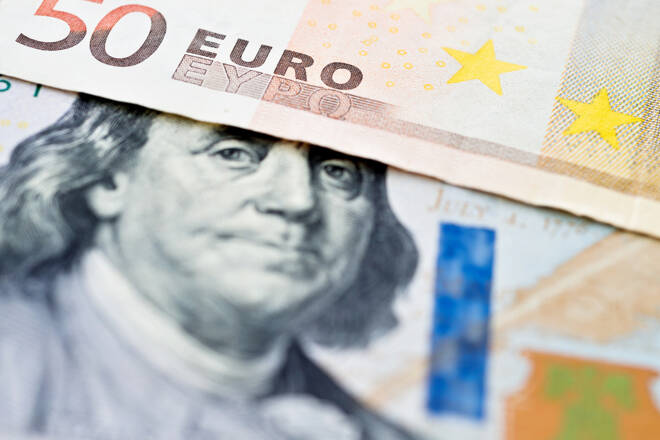Advertisement
Advertisement
EUR/USD Forecast: Eurozone Production and US CPI – A Dual Analysis
By:
EUR to USD Outlook: Amid whispers of 2024 inflation adjustments, ECB policy uncertainty and US inflation rates intertwine.
Highlights
- The EUR/USD experienced a modest gain of 0.03%, ending Tuesday at a notable $1.07538.
- ECB’s rate decisions face mounting pressures.
- The US CPI Report holds significant sway over both September and November’s Fed interest decisions.
Tuesday Overview
On Tuesday, the EUR/USD gained by 0.03%. After a 0.49% rise on Monday, the EUR/USD ended the day at $1.07538. The EUR/USD rose to a high of $1.07679 before falling to a low of $1.07055.
Eurozone Industrial Production to Set the Pre-ECB Tone
Eurozone industrial production will give investors more insight into the state of the Eurozone economy. Economists forecast a 0.7% decline in production for July, compared to a 0.5% increase in June.
We expect increased sensitivity to manufacturing sector numbers. While the manufacturing sector accounts for less than 20% of the Eurozone economy, a continued deterioration in sector conditions would be a drag on the broader Eurozone economy.
Eurozone economic sentiment in September worsened beyond expectations, with the ZEW Indicator dropping from -5.5 to -8.9. A deteriorating Eurozone economy could reduce consumption and demand-driven inflation, potentially reducing the urgency for the ECB to address persistent inflation.
Despite the gloomy macroeconomic backdrop, rumors of an upward revision to inflation forecasts for 2024 will provide more ECB policy uncertainty. The uncertainty toward the Thursday interest rate decision will likely increase investor sensitivity to the economic calendar.
US CPI Report to Battle Elevated Eurozone Inflation Expectations
The US CPI Report will likely decide the outcome of the September Fed interest rate decision and influence the November decision.
Hotter-than-expected core inflation and a more marked acceleration in headline inflation could force the Fed to lift rates higher.
Labor market conditions and wage growth continue to support consumption. Higher interest rates would weaken labor market conditions, easing wage growth and consumption-driven inflation.
Economists forecast the core annual inflation rate to soften from 4.7% to 4.3%. However, economists expect the annual inflation rate to accelerate from 3.2% to 3.6%, well above the 2% target.
Short-Term Forecast:
An upward revision to Eurozone inflation forecasts would pressure the ECB to push rates higher. However, the Eurozone economy also faces the risk of an ECB-fueled economic recession. The threat of a prolonged Eurozone recession would likely put EUR/USD on the defensive.
EUR/USD Price Action
Daily Chart
The EUR/USD hovered below the 50-day and 200-day EMAs, reaffirming bearish price signals. The EUR/USD could target the $1.07635 resistance level if Eurozone industrial production numbers ease fears of an economic recession.
However, further euro area inflation chatter and the US CPI Report will likely impact the EUR/USD more. Cooler-than-expected US inflation numbers and rising bets on an ECB rate hike would give the EUR/USD a look at $1.08. A break above the $1.07635 pivot would support a EUR/USD move toward the trend line and 200-day EMA.
The 14-period Daily RSI at 40.17 signals a EUR/USD fall to sub-$1.0650 before entering oversold territory.
4-Hour Chart
The EUR/USD holds below the 200-day and 50-day EMAs, reaffirming the bearish price signals. A break above the 50-day EMA and the $1.07635 resistance level would signal a EUR/USD move toward the trend line. However, the US CPI Report should ease bets on further Fed rate hikes to support a EUR/USD breakout.
Failure to break above the $1.07635 resistance level could see the EUR/USD target levels below $1.07.
The 14-period 4-Hourly RSI at 53.72 gives the EUR/USD room to target $1.08 before hitting overbought territory.
About the Author
Bob Masonauthor
With over 28 years of experience in the financial industry, Bob has worked with various global rating agencies and multinational banks. Currently he is covering currencies, commodities, alternative asset classes and global equities, focusing mostly on European and Asian markets.
Advertisement
